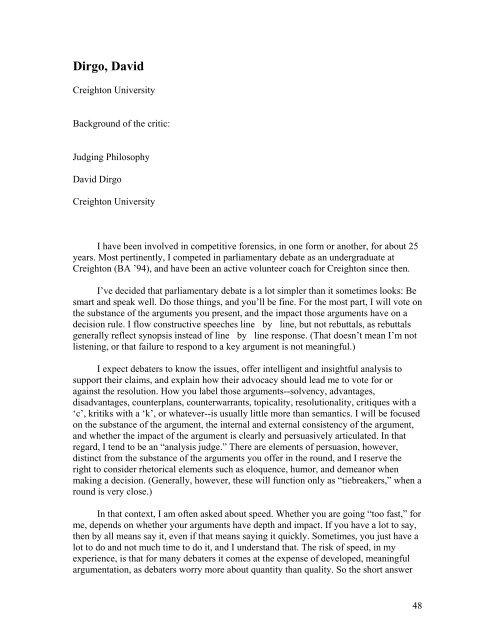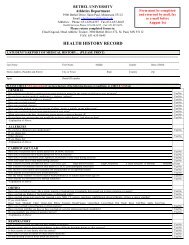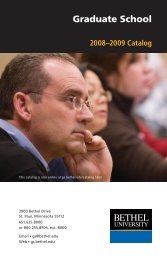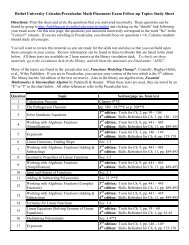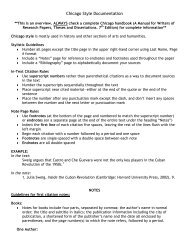here - College of Arts & Sciences - Bethel University
here - College of Arts & Sciences - Bethel University
here - College of Arts & Sciences - Bethel University
You also want an ePaper? Increase the reach of your titles
YUMPU automatically turns print PDFs into web optimized ePapers that Google loves.
Dirgo, David<br />
Creighton <strong>University</strong><br />
Background <strong>of</strong> the critic:<br />
Judging Philosophy<br />
David Dirgo<br />
Creighton <strong>University</strong><br />
I have been involved in competitive forensics, in one form or another, for about 25<br />
years. Most pertinently, I competed in parliamentary debate as an undergraduate at<br />
Creighton (BA ’94), and have been an active volunteer coach for Creighton since then.<br />
I’ve decided that parliamentary debate is a lot simpler than it sometimes looks: Be<br />
smart and speak well. Do those things, and you’ll be fine. For the most part, I will vote on<br />
the substance <strong>of</strong> the arguments you present, and the impact those arguments have on a<br />
decision rule. I flow constructive speeches linebyline, but not rebuttals, as rebuttals<br />
generally reflect synopsis instead <strong>of</strong> linebyline response. (That doesn’t mean I’m not<br />
listening, or that failure to respond to a key argument is not meaningful.)<br />
I expect debaters to know the issues, <strong>of</strong>fer intelligent and insightful analysis to<br />
support their claims, and explain how their advocacy should lead me to vote for or<br />
against the resolution. How you label those arguments--solvency, advantages,<br />
disadvantages, counterplans, counterwarrants, topicality, resolutionality, critiques with a<br />
‘c’, kritiks with a ‘k’, or whatever--is usually little more than semantics. I will be focused<br />
on the substance <strong>of</strong> the argument, the internal and external consistency <strong>of</strong> the argument,<br />
and whether the impact <strong>of</strong> the argument is clearly and persuasively articulated. In that<br />
regard, I tend to be an “analysis judge.” T<strong>here</strong> are elements <strong>of</strong> persuasion, however,<br />
distinct from the substance <strong>of</strong> the arguments you <strong>of</strong>fer in the round, and I reserve the<br />
right to consider rhetorical elements such as eloquence, humor, and demeanor when<br />
making a decision. (Generally, however, these will function only as “tiebreakers,” when a<br />
round is very close.)<br />
In that context, I am <strong>of</strong>ten asked about speed. Whether you are going “too fast,” for<br />
me, depends on whether your arguments have depth and impact. If you have a lot to say,<br />
then by all means say it, even if that means saying it quickly. Sometimes, you just have a<br />
lot to do and not much time to do it, and I understand that. The risk <strong>of</strong> speed, in my<br />
experience, is that for many debaters it comes at the expense <strong>of</strong> developed, meaningful<br />
argumentation, as debaters worry more about quantity than quality. So the short answer<br />
48


